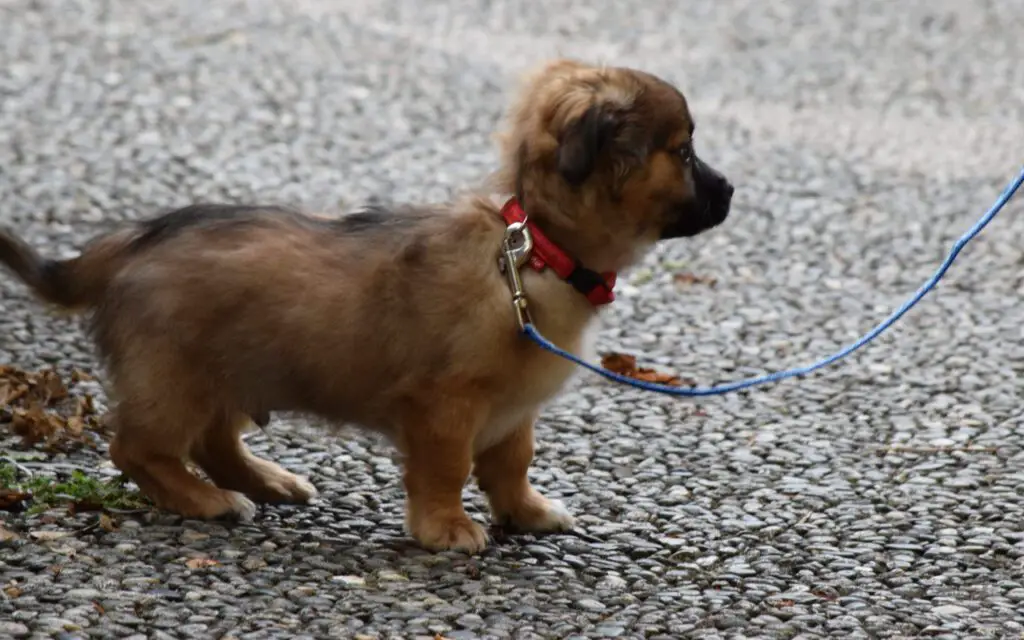As a dog owner, one of the most exciting and rewarding experiences is bringing home a new puppy.
Along with the joy and love they bring, puppies also require proper care and attention to ensure their health and well-being.
If you’re wondering whether you can walk your dog before they’ve received all their vaccinations, it’s essential to understand the risks and precautions involved.
In this article, we’ll discuss the importance of vaccinations for puppies, the potential risks of taking them for walks before they’re fully vaccinated, and how to safely socialize and exercise your furry friend during this critical stage of development.
- Can You Walk a Dog Before Vaccinations?
- When Can You Walk Puppy After Second Vaccination?
- Will My Pet Be Unwell After Vaccination?
- Puppies And Vaccinations – When Can Puppies Go Outside?
- How Long Should I Walk My Puppy For?
- Can Wild Animals Infect My New Puppy?
- When Can Puppies Meet Other Dogs?
- When Can Puppies Go Outside If They Are Carried?
- Can I Carry My Puppy Outside Before Vaccinations?
- FAQs
- Q: Can I walk my puppy before their first vaccine?
- Q: Is it safe to take my puppy for a walk before it receives all of its vaccines?
- Q: When can I start walking my puppy?
- Q: What is socialization and why is it important for my puppy?
- Q: How old does my puppy need to be before it can go to the park?
- Q: How long should I walk my puppy for?
- Q: Can I take my puppy on walks before they’re fully vaccinated?
- Q: How can I introduce my puppy to new people and other dogs?
- Q: How can I protect my puppy while introducing them to public places?
- Q: When will my puppy be fully vaccinated?
- In Conclusion
Key Takeaway
- It is generally recommended to wait until a puppy has received their full vaccinations before taking them for walks outside but walks within their own yard and neighborhood can be considered using common sense precautions.
- After a puppy has received their second round of vaccinations, it is generally safe to start walking them outdoors within a week.
- The duration of walks for puppies varies based on their age, but as a general guideline, it is recommended to walk them for about 5 minutes per month of age until they are fully grown.
Can You Walk a Dog Before Vaccinations?

No. It is generally not recommended to take a puppy out in public before it has been vaccinated.
This is because puppies have a weaker immune system and can be more vulnerable to contracting diseases that are easily spread by other animals.
Vaccinations help protect your pup against illnesses such as parvovirus, distemper, and rabies.
Additionally, some areas may require that dogs be vaccinated before they are allowed off-leash or taken to dog parks or other public places.
That being said, you can still take your puppy for short walks on a leash in quiet areas with little to no risk of exposure to other animals until it is fully vaccinated.
Make sure the area is free of feces, which can carry disease organisms, and avoid areas where other dogs have been.
When Can You Walk Puppy After Second Vaccination?

After your puppy has received their second vaccination, it is generally recommended to wait for 7 to 10 days before taking them for a walk in public spaces.
This waiting period allows the vaccine to fully take effect and provides your puppy with adequate immunity against common infectious diseases.
Puppies should receive their first vaccinations at 6-8 weeks old, and then their second one two to four weeks later.
After the second vaccine has been given, your puppy can start going out for walks in areas that are not heavily populated with other dogs or wild animals.
Keep in mind that until your puppy is fully vaccinated (at around 16 weeks old), they will still be susceptible to certain illnesses. So, it’s best to take extra precautions when taking them out in public spaces.
Will My Pet Be Unwell After Vaccination?
No, your pet will not be unwell after vaccination. Vaccines are designed to help protect your pet from certain illnesses and viruses.
After receiving a vaccine, some pets may experience mild reactions such as swelling at the injection site or occasional low-grade fever.
These side effects usually go away on their own without any medical intervention.
In rare cases, more serious reactions may occur but these should be reported to your veterinarian immediately.
It is important to keep in mind that the benefits of protection far outweigh the potential risks associated with vaccinations for your pet’s overall health and well-being.
By following recommended vaccination schedules, you can ensure that your four-legged friends stay healthy and happy!
Puppies And Vaccinations – When Can Puppies Go Outside?
Puppies can go outside as soon as they have had their first round of vaccinations. Generally, puppies should receive their first round of vaccinations between 6-8 weeks old.
This round usually includes the DHPP (distemper, hepatitis, parainfluenza, and parvovirus) vaccine.
At 10-12 weeks old, puppies should receive their second round of vaccinations which includes a booster for the DHPP vaccine and the rabies vaccine.
By 16 weeks old, puppies should have had all their core vaccines including the DHLPP (distemper, hepatitis, leptospirosis, parvo, and parainfluenza) and rabies vaccines.
How Long Should I Walk My Puppy For?
In general, puppies should get a minimum of 30 minutes of exercise each day. This can be broken up into multiple shorter walks throughout the day.
For larger breeds, you may need to increase the time as they get older. Make sure not to over-exercise your puppy by pushing them too hard or for too long. This can cause injuries and exhaustion.
Can Wild Animals Infect My New Puppy?
It is possible for wild animals to infect your new puppy with diseases. Foxes, skunks, and raccoons are particularly prone to rabies and can be carriers of the virus, which is transmitted by the bite of a rabid animal to another mammal.
Other diseases that can be passed on from wildlife to your puppy include distemper and canine parvovirus.
Distemper is spread through contact with an infected animal or their bodily fluids, while canine parvovirus can be passed on from wild carnivores such as raccoons and cougars.
In addition to these infectious diseases, there is also a risk of injury if your puppy comes into contact with wildlife.
It is important to keep your puppy away from areas where there may be wild animals in order to reduce the risk of them catching any illnesses or being injured.
When Can Puppies Meet Other Dogs?
Puppies can start meeting other dogs as soon as they are fully vaccinated, which usually happens around 16-18 weeks of age.
It’s important that puppies meet and socialize with other dogs during this critical period of development in order to help them learn how to interact appropriately and become comfortable around all kinds of people and animals.
Before you take your puppy out for interactions with other dogs, make sure he is up-to-date on his vaccinations and has a clean bill of health from the vet.
Start by introducing him to one or two friendly, healthy adult dogs in a controlled environment such as your own backyard or a nearby park.
When Can Puppies Go Outside If They Are Carried?
If you carry your puppy in your arms or use a pet carrier, you can safely take them outside even before they have completed their full vaccination schedule.
Carrying your puppy minimizes the risk of them coming into contact with contaminated surfaces, infected animals, or harmful pathogens.
However, it’s important to exercise caution and avoid areas with high dog traffic or where unvaccinated dogs might be present.
Examples of such places include dog parks, pet stores, and busy sidewalks. Taking your puppy to controlled environments, such as a friend’s house with vaccinated pets, can be a safer option for early socialization.
Can I Carry My Puppy Outside Before Vaccinations?
Yes, you can carry your puppy outside before they have completed their full vaccination schedule, as long as you take some precautions.
Carrying your puppy in your arms or using a pet carrier minimizes the risk of them coming into contact with contaminated surfaces, infected animals, or harmful pathogens.
However, it’s important to be cautious and avoid areas where unvaccinated dogs might be present or where there is high dog traffic, such as dog parks, pet stores, or busy sidewalks.
Instead, opt for controlled environments, like visiting a friend’s house with vaccinated pets, for early socialization opportunities.
FAQs
Q: Can I walk my puppy before their first vaccine?
A: It is generally recommended that you wait until after your pup receives their first set of vaccinations and they are at least 8 weeks old before taking them for their first walk.
Q: Is it safe to take my puppy for a walk before it receives all of its vaccines?
A: Walking your puppy before it is fully vaccinated can expose them to a variety of diseases, including parvovirus and distemper. It’s best to wait until your dog is fully vaccinated before taking them for a walk.
Q: When can I start walking my puppy?
A: You can start walking your puppy once they have received their first set of vaccinations and they are at least 8 weeks old.
Q: What is socialization and why is it important for my puppy?
A: Socialisation is the process of introducing your puppy to new people, places, and other animals. This is important to help your puppy become well-adjusted and comfortable in a variety of situations.
Q: How old does my puppy need to be before it can go to the park?
A: Your puppy can go to the park once they have received their full set of vaccinations and they are at least 16 weeks of age.
Q: How long should I walk my puppy for?
A: A good rule of thumb is to walk your puppy for five minutes for every month of age. So if your puppy is three months old, they should be walked for 15 minutes.
Q: Can I take my puppy on walks before they’re fully vaccinated?
A: It’s important to take your puppy on walks before they’re fully vaccinated to get them used to the wide world around them. However, you should avoid public places and let your puppy interact with unvaccinated dogs or any dogs that may be infected with kennel cough.
Q: How can I introduce my puppy to new people and other dogs?
A: To introduce your puppy to new people and other dogs, start with short and controlled interactions. Supervise all interactions and gradually increase the duration and intensity of the interactions.
Q: How can I protect my puppy while introducing them to public places?
A: To protect your puppy while introducing them to public places, carry them or use a carrier until they are fully vaccinated. Avoid letting your puppy walk on the ground in public areas or interact with other dogs.
Q: When will my puppy be fully vaccinated?
A: Your puppy will be fully vaccinated after they have received their final set of vaccinations, which is usually around 12-16 weeks of age.
In Conclusion
While it’s essential for puppies to socialize and exercise, walking your dog before they’ve received all their vaccinations can pose significant health risks.
It’s crucial to balance the need for socialization with the safety of your pup during this critical stage in their development.
Consult with your veterinarian about the appropriate vaccination schedule and safe ways to introduce your puppy to new experiences, environments, and other dogs.





Leave a Reply